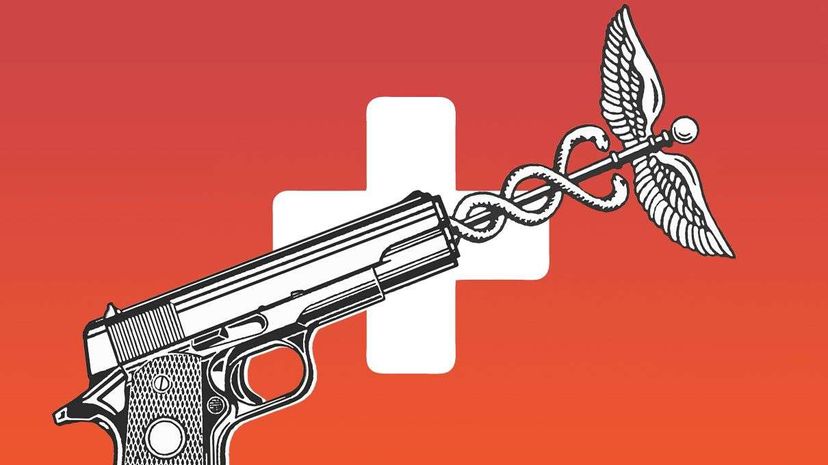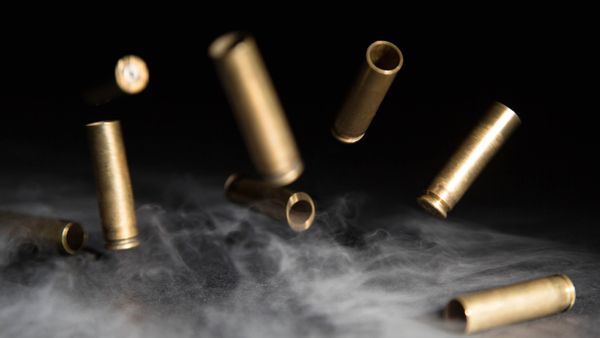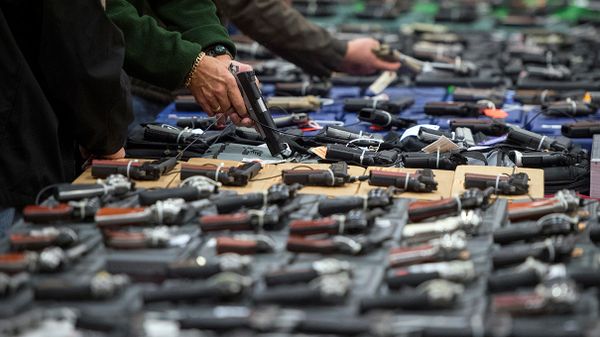
At the doctor's office, we're accustomed to answering all sorts of personal inquiries and sharing information that we might not tell anyone else. But one question that many physicians in the United States are asking is causing controversy: Do you have guns in your home?
As many doctors see it, the presence of firearms—particularly unsecured ones-- is a potential health issue, because of the risk of accidents that can cause serious injury or death, if young children and adolescents can get access to those weapons. Another worry is that the easy availability of a gun will make it too easy for a person who becomes despondent to commit suicide.
Advertisement
Dr. Alice Kuo, who works in a primary-care practice in Santa Monica, California, says she's been routinely asking families for years if they have firearms around. "It's standard in pediatric well-child visits, as early as infancy," Kuo, who is also an associate professor of pediatrics and internal medicine at UCLA, writes in an email.
If the answer is yes, more questions might follow about where and how the gun is stored, and what precautions — such as trigger locks or a safe — are in place to ensure that the weapon isn't misused.
"Most of the time the parents have just not thought about the guns which might be in the home, and appreciate us bringing it up to make sure their children are safe," Kuo explained. (Here's a recent article that she and colleague Dr. Angelica Zen co-wrote, in which they discuss their experiences with those patients.)
Some of those concerns are borne out by the numbers. Across the U.S., more than two million children live in homes with guns that are not stored safely and securely, according to Everytown for Gun Safety, a group that strives to reduce shooting injuries and deaths. The U.S. Centers for Disease Control and Prevention found that about 500 people were killed in accidental shootings in 2013, the most recent year for which statistics are available. That included 69 victims ages 14 or under.
And when it came to adults, suicides by bullet accounted for 63 percent of the nation's 33,636 firearm deaths in 2013 — nearly twice the portion of people who were shot to death intentionally by someone else.
Proponents of doctors asking patients about gun ownership say that it can prevent such tragedies. That's backed up by a 2003 study of medical patients who answered a questionnaire and said that they possessed firearms. After being counseled by their doctors, roughly 60 percent of the patients made changes to improve their safety procedures for storing their guns.
Gun advocates, though, see this in a different light. To them, doctors' inquiries are an intrusion upon gun owners' rights. The National Rifle Association, for example, complained in a recent blog post that physicians who want to know about firearms are pushing an anti-gun political agenda. "Doctors do not receive firearm safety training in medical school, and advising patients about the many nuances of gun ownership is far outside their field of expertise," the lobbying group wrote.
In 2010, gun rights proponents managed to get a provision inserted into the Patient Protection and Affordable Care Act — AKA Obamacare — that bars both health insurers and wellness and prevention programs from asking participants about gun ownership. Proposed legislation in at least 10 states would bar physicians from asking their patients about guns.
So far, though, only one state — Florida, in 2011 — has passed a law restricting doctors and other healthcare professionals from asking about a patient's guns or putting information on them into medical records, and giving patients the right to refuse to answer such questions. The "docs vs. Glocks" law, as newspaper headline writers dubbed it, currently is being challenged in federal court by an assortment of individual physicians and medical groups.
There have been misconceptions about the Florida law. It does allow doctors to ask about guns, but if they believe in good faith that "that this information is relevant to the patient's medical care or safety, or the safety of others."
So, at least for the time being, it looks as if doctors can and will continue to ask patients about their weaponry, in hopes that it will reduce firearm injuries and deaths.
Advertisement

